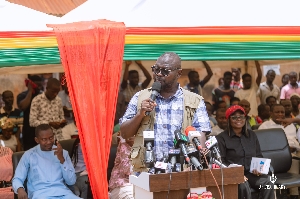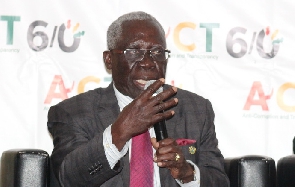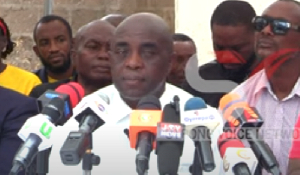 CEO of Accra Metropolitan Assembly, Mohammed Adjei Sowah
CEO of Accra Metropolitan Assembly, Mohammed Adjei Sowah
A research study on Municipal Solid Waste Characterization and Landfill Emissions in the city of Accra and neighbouring municipalities within the Greater Accra Metropolitan Area (GAMA), has found that the per capita waste generation rate for households, markets and institutions was 0.70kg, 1.32 kg per shop and 0.83 kg respectively.
According to the study whilst average per capita generation rates within low-income areas is 0.51 kg, that of their high-income counterparts stands at 0.91 kg; confirming already known trends in which the affluent in society is reported to spend more and thus generate more waste than their urban poor counterparts.
The research study which was conducted by the Directorate of Research, Innovation and Consultancy (DRIC) of the University of Cape Coast (UCC), and funded by the C40 Leadership group, a not-for-profit organization based in Delaware, USA, also revealed that the three most significant components within households waste are organics (53.91%), plastics (16.15%) and inert materials (12.67%), mainly composed of silt and fines.
The research further revealed that whilst there was relatively higher percentage of plastics within the waste of government agencies, hospitals and schools, the waste of restaurants/eateries, hotels and banks are rather dominated by organic wastes with that from markets being highly composed of organics (56.27%) followed by plastics (13.59%), textiles (13.17%) and paper (8.75%).
Speaking at an event to validate the final report on the Municipal Solid Waste Characterization research at the Accra City Hall, which is managed by Listening Bureau on Wednesday, the Mayor of Accra, Mohammed Adjei Sowah said the results of the study provide city authorities with the opportunity of understanding of the components of waste being generated and how best to turn them into a resource.
He noted that the final report would be published soon and expressed appreciation to C40 for funding the project and the team of researchers for extensive work done.
Kwaku Oduro-Appiah, the Lead Researcher of the study and also Lecturer at the Department of Water and Sanitation, the University of Cape Coast who presented the report said the average net calorific value of 7.31MJ/kg, was well within the recommended threshold for consideration of Waste-to-Energy (WtE) as a treatment option; but the other necessary factors of low moisture content, low silts and fines composition, absence of sustainable financing and the lack of an integrated solid waste management strategy means that WtE would not be a viable treatment technology for the waste of the GAMA as it stands.
He noted that further improvements in storage, separation at source, collection coverages, recycling behaviour as well as controlled disposal options were necessary factors to prepare the municipalities for a future WtE technology consideration.
He announced that the total solid waste disposed on the two main landfills for GAMA in the year 2019 was 688,482.65 metric tons; 346,633.17 and 341,849.50 metric tons at Kpone and Nsumia respectively adding that the city’s two main landfills produced 28,303 tonnes of Methane (CH4) and 77,833 tonnes of biogenic Carbon dioxide CO2(b) in 2019.
He said the total emissions arising from the solid waste of the GAMA in 2019 were 785,411 tonnages of Carbon dioxide Equivalence, (tCO2e).
"A total of 395434 tonnages of Carbon dioxide Equivalence, (tCO2e) of Green House Emissions (GHGs) were emitted from the solid waste generated and disposed on the Kpone landfill site in 2019 whilst emission realized on the Nsumia landfill site was 389,977 tCO2e. These together put the total GHG emissions arising from the MSW of the GAMA in 2019 to 785,411 tCO2e, " he said.
Touching on the recommendation of the report the Lead Researcher mentioned that the high percentage of putrescible organic waste and plastics in the city's solid waste calls for urgent development of action plans towards diversion from disposal adding that plans geared towards the use of results-based financing mechanisms as incentives as well as beliefs that influence behavioural intention towards separation were urgent and necessary.
He also stressed the need for investment in infrastructure for locally appropriate and low-cost composting and anaerobic digestion, to divert putrescible organics from landfill sites to further reduce the GHG emission resulting from the current solid waste disposal practices.
Mr Solomon Noi, the Director of Waste Management, at the AMA in a remark said the main goal of the project among others was to support the city to bridge the baseline data gap in solid waste management, develop and design targeted climate change action policies and programmes, identify suitable treatment technologies.
He acknowledged the importance of the study and observed that the city was equipped with the relevant scientific data on how best to deal with waste management issues.
"So, in a nutshell at least, for now, we can be firm to say that we have some baseline data on the properties of municipal solid waste for the GAMA, which we can rely on since it had been validated here by stakeholders from academia, industry and municipalities. This will support managing authorities and policymakers towards informed decision making in the modernization of the city’s solid waste management system, " he said.
The Greater Accra Metropolitan Area (GAMA) lies along the South-Eastern coast of Ghana and covers an area of 1453.53 km2. It consists of 25 municipalities and it is home to the capital city (Accra) and the industrial hub (Tema) of the country.










